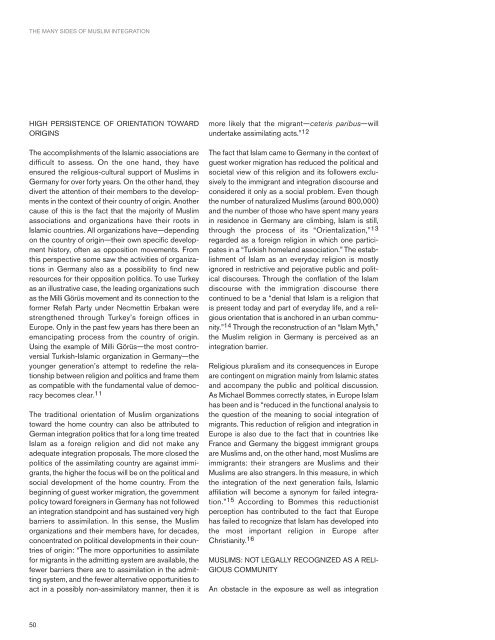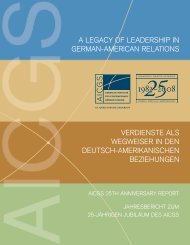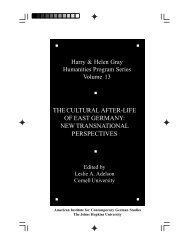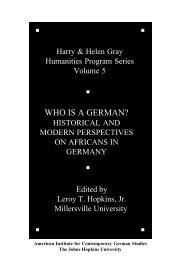the many sides of muslim integration: a german- american - aicgs
the many sides of muslim integration: a german- american - aicgs
the many sides of muslim integration: a german- american - aicgs
Create successful ePaper yourself
Turn your PDF publications into a flip-book with our unique Google optimized e-Paper software.
<strong>the</strong> <strong>many</strong> <strong>sides</strong> <strong>of</strong> <strong>muslim</strong> <strong>integration</strong><br />
HIGH PERSISTENCE OF ORIENTATION TOWARD<br />
ORIGINS<br />
The accomplishments <strong>of</strong> <strong>the</strong> Islamic associations are<br />
difficult to assess. On <strong>the</strong> one hand, <strong>the</strong>y have<br />
ensured <strong>the</strong> religious-cultural support <strong>of</strong> Muslims in<br />
Ger<strong>many</strong> for over forty years. On <strong>the</strong> o<strong>the</strong>r hand, <strong>the</strong>y<br />
divert <strong>the</strong> attention <strong>of</strong> <strong>the</strong>ir members to <strong>the</strong> developments<br />
in <strong>the</strong> context <strong>of</strong> <strong>the</strong>ir country <strong>of</strong> origin. Ano<strong>the</strong>r<br />
cause <strong>of</strong> this is <strong>the</strong> fact that <strong>the</strong> majority <strong>of</strong> Muslim<br />
associations and organizations have <strong>the</strong>ir roots in<br />
Islamic countries. All organizations have—depending<br />
on <strong>the</strong> country <strong>of</strong> origin—<strong>the</strong>ir own specific development<br />
history, <strong>of</strong>ten as opposition movements. From<br />
this perspective some saw <strong>the</strong> activities <strong>of</strong> organizations<br />
in Ger<strong>many</strong> also as a possibility to find new<br />
resources for <strong>the</strong>ir opposition politics. To use Turkey<br />
as an illustrative case, <strong>the</strong> leading organizations such<br />
as <strong>the</strong> Milli Görüs movement and its connection to <strong>the</strong><br />
former Refah Party under Necmettin Erbakan were<br />
streng<strong>the</strong>ned through Turkey’s foreign <strong>of</strong>fices in<br />
Europe. Only in <strong>the</strong> past few years has <strong>the</strong>re been an<br />
emancipating process from <strong>the</strong> country <strong>of</strong> origin.<br />
Using <strong>the</strong> example <strong>of</strong> Milli Görüs—<strong>the</strong> most controversial<br />
Turkish-Islamic organization in Ger<strong>many</strong>—<strong>the</strong><br />
younger generation’s attempt to redefine <strong>the</strong> relationship<br />
between religion and politics and frame <strong>the</strong>m<br />
as compatible with <strong>the</strong> fundamental value <strong>of</strong> democracy<br />
becomes clear. 11<br />
The traditional orientation <strong>of</strong> Muslim organizations<br />
toward <strong>the</strong> home country can also be attributed to<br />
German <strong>integration</strong> politics that for a long time treated<br />
Islam as a foreign religion and did not make any<br />
adequate <strong>integration</strong> proposals. The more closed <strong>the</strong><br />
politics <strong>of</strong> <strong>the</strong> assimilating country are against immigrants,<br />
<strong>the</strong> higher <strong>the</strong> focus will be on <strong>the</strong> political and<br />
social development <strong>of</strong> <strong>the</strong> home country. From <strong>the</strong><br />
beginning <strong>of</strong> guest worker migration, <strong>the</strong> government<br />
policy toward foreigners in Ger<strong>many</strong> has not followed<br />
an <strong>integration</strong> standpoint and has sustained very high<br />
barriers to assimilation. In this sense, <strong>the</strong> Muslim<br />
organizations and <strong>the</strong>ir members have, for decades,<br />
concentrated on political developments in <strong>the</strong>ir countries<br />
<strong>of</strong> origin: “The more opportunities to assimilate<br />
for migrants in <strong>the</strong> admitting system are available, <strong>the</strong><br />
fewer barriers <strong>the</strong>re are to assimilation in <strong>the</strong> admitting<br />
system, and <strong>the</strong> fewer alternative opportunities to<br />
act in a possibly non-assimilatory manner, <strong>the</strong>n it is<br />
50<br />
more likely that <strong>the</strong> migrant—ceteris paribus—will<br />
undertake assimilating acts.” 12<br />
The fact that Islam came to Ger<strong>many</strong> in <strong>the</strong> context <strong>of</strong><br />
guest worker migration has reduced <strong>the</strong> political and<br />
societal view <strong>of</strong> this religion and its followers exclusively<br />
to <strong>the</strong> immigrant and <strong>integration</strong> discourse and<br />
considered it only as a social problem. Even though<br />
<strong>the</strong> number <strong>of</strong> naturalized Muslims (around 800,000)<br />
and <strong>the</strong> number <strong>of</strong> those who have spent <strong>many</strong> years<br />
in residence in Ger<strong>many</strong> are climbing, Islam is still,<br />
through <strong>the</strong> process <strong>of</strong> its “Orientalization,” 13<br />
regarded as a foreign religion in which one participates<br />
in a “Turkish homeland association.” The establishment<br />
<strong>of</strong> Islam as an everyday religion is mostly<br />
ignored in restrictive and pejorative public and political<br />
discourses. Through <strong>the</strong> conflation <strong>of</strong> <strong>the</strong> Islam<br />
discourse with <strong>the</strong> immigration discourse <strong>the</strong>re<br />
continued to be a “denial that Islam is a religion that<br />
is present today and part <strong>of</strong> everyday life, and a religious<br />
orientation that is anchored in an urban community.”<br />
14 Through <strong>the</strong> reconstruction <strong>of</strong> an “Islam Myth,”<br />
<strong>the</strong> Muslim religion in Ger<strong>many</strong> is perceived as an<br />
<strong>integration</strong> barrier.<br />
Religious pluralism and its consequences in Europe<br />
are contingent on migration mainly from Islamic states<br />
and accompany <strong>the</strong> public and political discussion.<br />
As Michael Bommes correctly states, in Europe Islam<br />
has been and is “reduced in <strong>the</strong> functional analysis to<br />
<strong>the</strong> question <strong>of</strong> <strong>the</strong> meaning to social <strong>integration</strong> <strong>of</strong><br />
migrants. This reduction <strong>of</strong> religion and <strong>integration</strong> in<br />
Europe is also due to <strong>the</strong> fact that in countries like<br />
France and Ger<strong>many</strong> <strong>the</strong> biggest immigrant groups<br />
are Muslims and, on <strong>the</strong> o<strong>the</strong>r hand, most Muslims are<br />
immigrants: <strong>the</strong>ir strangers are Muslims and <strong>the</strong>ir<br />
Muslims are also strangers. In this measure, in which<br />
<strong>the</strong> <strong>integration</strong> <strong>of</strong> <strong>the</strong> next generation fails, Islamic<br />
affiliation will become a synonym for failed <strong>integration</strong>.”<br />
15 According to Bommes this reductionist<br />
perception has contributed to <strong>the</strong> fact that Europe<br />
has failed to recognize that Islam has developed into<br />
<strong>the</strong> most important religion in Europe after<br />
Christianity. 16<br />
MUSLIMS: NOT LEGALLY RECOGNIZED AS A RELI-<br />
GIOUS COMMUNITY<br />
An obstacle in <strong>the</strong> exposure as well as <strong>integration</strong>





